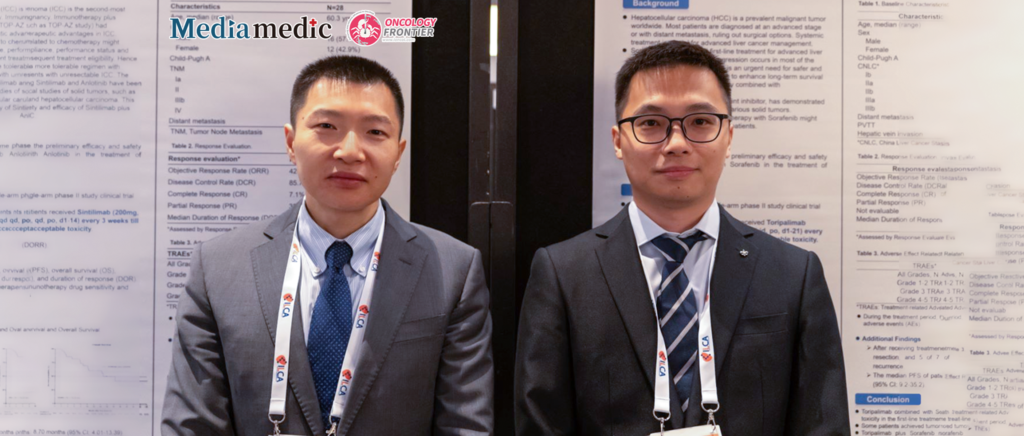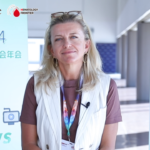
Editor’s Note: From October 17-19, 2024, global experts and scholars in liver cancer research gathered in Toronto, Canada, to witness the 18th International Liver Cancer Association (ILCA) Annual Conference. At this conference, the research team led by Academician Jia Fan , Professor Jian Zhou , and Professor Xinrong Yang from Zhongshan Hospital of Fudan University presented two groundbreaking studies that garnered significant attention. The studies focused on combined targeted and immunotherapy for hepatocellular carcinoma (HCC) and intrahepatic cholangiocarcinoma (ICC). The team explored the combination of sorafenib with toripalimab (a PD-1 antibody), achieving a 50% objective response rate (ORR) and converting 23.3% of previously unresectable tumors to resectable status in HCC patients. In another study, the combination of anlotinib with sintilimab (another PD-1 antibody) showed a 42.9% ORR in ICC patients, a nearly 20% improvement compared to traditional chemotherapy. These studies not only highlight the significant potential of combined targeted and immunotherapy for HCC and ICC but also bring new hope for long-term survival for patients. Oncology Frontier invited Professor Xinrong Yang to share insights from these studies at the ILCA conference.1. Two Studies Presented at ILCA
Oncology Frontier: Professor Yang, you presented two studies at this year’s ILCA conference. Could you briefly introduce the key findings of each study?
Professor Xinrong Yang: At this year’s ILCA conference, our team was honored to present two important research outcomes. One study (abstract number: P-126) focused on the combination of sorafenib with toripalimab (a PD-1 antibody) in a phase II clinical trial for HCC. For patients with unresectable HCC, especially those in the first-line treatment stage, our approach achieved a 50% response rate. Notably, about 20% of the patients saw their previously unresectable tumors converted to a resectable state, opening new avenues for subsequent treatments.
Study 2: The Clinical Efficacy and Safety of Sintilimab Plus Anlotinib for Unresectable Intrahepatic Cholangiocarcinoma: A Prospective, Single-Arm Phase II Study(P-125)
ICC is the second most common primary liver malignancy. While immunotherapy combined with chemotherapy (as in the TOP-AZ study) has shown significant therapeutic advantages for ICC, severe chemotherapy-related adverse events (AEs) can impact treatment compliance, physical condition, quality of life, and even eligibility for further treatment. Thus, there is an urgent need for a therapy with comparable efficacy and better tolerability. In various solid tumors (such as NSCLC and HCC), the combination of sintilimab with anlotinib has demonstrated clinical benefits. Our study aimed to explore the safety and efficacy of this combination in unresectable ICC.
This was a prospective, single-arm, open-label exploratory phase II study (ChiCTR2000035901). Eligible ICC patients received sintilimab (200 mg, intravenously, day 1) and anlotinib (12 mg, orally, days 1-14) every 3 weeks until disease progression or unacceptable toxicity. The primary endpoint was overall response rate (ORR) assessed by RECIST v1.1. Secondary endpoints included progression-free survival (PFS), disease control rate (DCR), duration of response (DOR), overall survival (OS), conversion surgery rate, safety, and tolerability.
By the end of June 2024, 28 patients had been enrolled, with a median age of 60.3 years (range 36-74), 57.1% male, and all patients were Child-Pugh class A. 26 out of 28 patients (92.9%) had TNM stage IIIb/IV disease, and 11 out of 28 (39.3%) had distant metastases. All patients were evaluated for efficacy, with a confirmed ORR of 42.9% and DCR of 85.7%. Among them, 7.1% (2/28) achieved complete response (CR), and 35.7% (10/28) had partial response (PR). The median PFS was 8.70 months (95% CI: 4.01-13.39), and the median OS was 18.33 months (95% CI: 11.71-24.95). Seven patients (25.0%) underwent conversion surgery, with 4 remaining tumor-free at the last follow-up. 82.1% of patients experienced treatment-related adverse events (TRAEs), the most common being hypertension (57.1%). Grade 3 TRAEs occurred in 32.1% of patients, with no grade 4-5 TRAEs.
Given its promising efficacy and safety profile, the combination of sintilimab with anlotinib may be a feasible and safe chemotherapy-free approach for the treatment of unresectable ICC. All patients have now completed enrollment, and follow-up is ongoing.
In another study (abstract number: P-125), we explored the efficacy of anlotinib combined with sintilimab (another PD-1 antibody) in the treatment of unresectable ICC. This phase II clinical trial also yielded remarkable results, achieving an ORR of over 40%, a significant improvement compared to traditional chemotherapy for ICC, which typically achieves response rates of only 15%-20%. This nearly 20% improvement represents a significant breakthrough in clinical treatment.
Study 1: The Efficacy and Safety of Toripalimab Combined with Sorafenib for Unresectable Hepatocellular Carcinoma: An Open-Label, Prospective, Single-Arm Phase II Study (P-126)
HCC is one of the most common malignancies worldwide. Most patients are diagnosed at an advanced stage or have distant metastases, making them ineligible for surgery. For advanced HCC, systemic therapy is critical. Sorafenib is the standard first-line treatment for advanced HCC, but most patients experience disease progression within a year. Thus, there is an urgent need for safer and more effective treatments to improve long-term survival in HCC patients. The immune checkpoint inhibitor toripalimab has shown good efficacy and safety in multiple solid tumors, and its combination with sorafenib may change treatment outcomes for HCC patients. This study aimed to assess the preliminary efficacy and safety of toripalimab combined with sorafenib for advanced HCC.
This was an open-label, prospective, single-arm phase II clinical trial (NCT04926532). Eligible patients with unresectable HCC received toripalimab (240 mg, intravenously, day 1) and sorafenib (400 mg, orally twice daily, days 1-21) every 3 weeks until disease progression or unacceptable toxicity. The primary endpoints were ORR and safety, assessed by RECIST v1.1. Secondary endpoints included PFS, OS, DCR, and DOR. Exploratory endpoints included biomarkers for immunotherapy sensitivity and efficacy monitoring.
As of June 24, 2024, 30 patients had been enrolled, with a median age of 60.5 years (range 42-75), 86.7% male, and all patients were Child-Pugh class A. The median follow-up time was 22.9 months (3.3-47.4). According to the China Liver Cancer Staging (CNLC) system, 23.3%, 20.0%, 23.3%, 30.0%, and 3.3% of patients were at stages Ib, IIa, IIb, IIIa, and IIIb, respectively. Among all patients, 20.0% had distant metastases, 26.7% had portal vein tumor thrombus (PVTT), and 10.0% had hepatic vein invasion. The ORR was 46.7% (14/30), and the DCR was 53.3% (16/30). Among all patients, 13.3% (4/30) achieved CR, and 33.3% (10/30) achieved PR. The median DOR was 3.4 months (95% CI: 1.2-29.4). The median PFS was 22.0 months (95% CI: 1.5-44.4), and the median OS was 34.2 months (95% CI: 20.7-47.7). After treatment, 23.3% (7/30) of patients underwent surgical resection, with 71.4% (5/7) remaining disease-free at the last follow-up. The median PFS for surgery patients was 20.2 months (95% CI: 2.2-23.0). Six patients (20.0%) discontinued treatment due to adverse events (AEs). Treatment-related AEs occurred in 96.7% of patients, with grade 1-2 TRAEs in 93.3% of patients and grade 3 TRAEs in 43.3%, with no grade 4-5 TRAEs.
The study results suggest that toripalimab combined with sorafenib demonstrates encouraging efficacy and tolerable toxicity as a first-line treatment for unresectable HCC. Some patients achieved tumor downstaging and underwent surgical resection, indicating that this combination may be a viable first-line option for unresectable HCC.
2. The Prospects of Chemotherapy-Free Approaches for ICC
Oncology Frontier: Immunotherapy combined with chemotherapy is a common strategy for ICC. How do you see the future of chemotherapy-free approaches in treating ICC?
Professor Xinrong Yang: Advanced ICC is an extremely aggressive malignancy with a 5-year overall survival rate of less than 5%. Traditional first-line treatments typically involve platinum-based chemotherapy combined with gemcitabine, which, although effective in unresectable ICC, only offers a median survival of 8-10 months.
To explore more effective treatment methods, we conducted this study to investigate the combination of tyrosine kinase inhibitors (TKIs) with PD-1 immunotherapy drugs. Compared to traditional chemotherapy, this new approach achieved a significant improvement in efficacy, with a roughly 20% increase in overall response rates.
Chemotherapy is often associated with substantial side effects, particularly neurotoxicity and myelosuppression, which prevent many patients from continuing treatment long-term. Therefore, our study focused on a chemotherapy-free approach, combining a PD-1 inhibitor with a TKI to enable some patients to receive long-term treatment while reducing side effects. Compared to chemotherapy, this approach caused fewer cases of myelosuppression and no neurotoxicity, allowing more patients to tolerate and continue treatment, thereby improving overall survival rates.
Looking forward, as chemotherapy-free systemic treatments become more widespread in ICC, we believe that if future phase III clinical studies confirm these results, this new therapy will become another important tool in ICC treatment.
3. Biomarkers in ICC Treatment
Oncology Frontier: Are there specific biomarkers to predict patient response to sintilimab combined with anlotinib in ICC treatment? How can these biomarkers guide personalized treatment?
Professor Xinrong Yang: Currently, there is a lack of highly effective treatment options for ICC in the field of tumor immunotherapy, and finding effective biomarkers (or targets) has become a key focus in ongoing clinical research. We are actively exploring this area, particularly in terms of efficacy monitoring, and searching for reliable biomarkers is essential. Although tumor markers and circulating tumor DNA (ctDNA) from liquid biopsies have been suggested as potential targets for monitoring efficacy, the number of clinically applicable markers remains limited.
During our clinical investigations, we collected serum and tumor tissue samples from patients for in-depth research. Through single-cell sequencing technology, we have made some progress in this regard. We identified a specific group of immune cells that can predict the response to PD-1 antibody and TKI combination therapy. This discovery provides a new direction for our future research.
As our research continues, we hope to discover more effective biomarkers. These discoveries will not only provide more precise monitoring methods but may also lead to breakthroughs in ICC immunotherapy. We will continue to focus on this field to offer better treatment options and higher quality of life for patients.
4. Optimizing Combination Therapy in HCC
Oncology Frontier: While the combination of toripalimab and sorafenib has shown good efficacy in HCC treatment, adverse effects remain a concern. Are there plans to further optimize the combination therapy to improve patient quality of life and treatment compliance?
Professor Xinrong Yang: As a leading-edge immunotherapy drug, toripalimab, combined with the classic targeted drug sorafenib, has demonstrated remarkable breakthroughs in HCC treatment. Historically, the response rate for sorafenib alone in liver cancer hovered at around 3%-5%. In our innovative study, we found that the response rate surged to nearly 50% with the inclusion of toripalimab, marking a milestone in the history of liver cancer treatment.
However, while this combination therapy brings new hope to HCC patients, we must also address the associated side effects. In clinical practice, we observed a range of immune-related adverse reactions, including pneumonia, rash, severe hypertension, and diarrhea, which require close attention from the medical team. These treatment-related adverse effects not only risk shortening the duration of targeted and immunotherapy use but may also lead some patients to discontinue treatment prematurely or suffer severe complications, which could be life-threatening in extreme cases. Although no severe treatment-related adverse events (SAEs) resulting in death were observed in our study, grade 1-3 complications remain common and cannot be ignored.
Thus, looking ahead, we need to pay closer attention to patient complications in clinical practice and adopt effective preventive measures to ensure that patients can complete adequate treatment courses and dosages, ultimately maximizing overall treatment effectiveness and bringing a brighter future to HCC patients.
Professor Xinrong Yang Chief Physician, Professor, and Doctoral Supervisor, Department of Hepatic Surgery, Zhongshan Hospital of Fudan University Recipient of China’s National High-Level Talents Special Support Plan Member of ILCA, ASCO, AACR, ILTS Deputy Leader of several workgroups in surgical quality control and enhanced recovery *Published over 80 SCI papers as first or corresponding author, including in Cell, Nature, and Lancet Oncology


